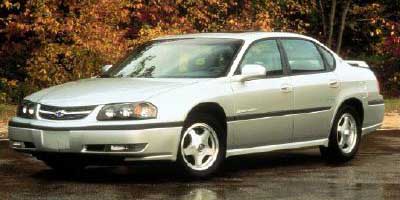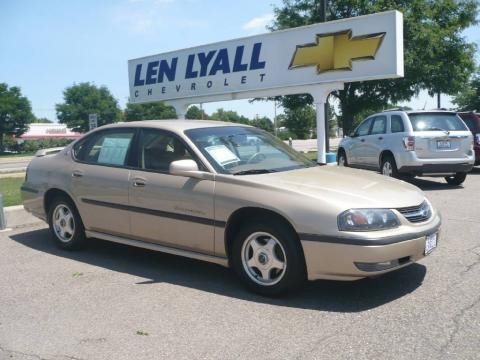Ed Cole, Chevrolet's chief engineer in the late 1950s, defined the Impala as a "prestige car within the reach of the average American citizen."

Chevrolet Impala (2000)

2000 Chevrolet Impala LS
The Impala name was first used for the full-sized 1956 General Motors Motorama show car that bore Corvette-esque design cues, especially the grille. Painted emerald green metallic, with a white interior, the Impala featured hardtop styling. It is not known to have survived. Clare MacKichan's design team, along with designers from Pontiac, started to establish basic packaging and dimensions for their shared 1958 General Motors A body in June; the first styling sketch that would directly influence the finished Chevrolet product caught the eye of General Motors Styling vice president Harley Earl in October. Seven months later, the basic design was worked.

The 2000 Chevrolet Impala is
From 1958 through 1996, Impala sales were in excess of 13 million, more than any other full-size car in the history of the automobile. The 1964 model year sales of 1,074,925 units (Impala and Impala SS) in the U.S. still stands as a record. 1965 wasn't far behind with 1,046,500 units. In 2008, Impala was the 6th best-selling car in the United States and had the distinction of being the top-selling American nameplate sedan, according to Reuters Top 20 Best-selling Vehicles Scorecard.

Chevrolet Impala (2000)
The Impala was introduced in 1958 and positioned as top of the line Bel Air coupes and convertibles. From the windshield pillar rearward, the 1958 Chevrolet Bel Air Impala differed structurally from typical Chevrolets. Hardtops had a slightly shorter greenhouse and longer rear deck, giving the impression of an extended body.

Chevrolet Impala 2000

Pictures of 2000 Chevrolet
It was a change from the 1955–1957 shape that was itself a substantial move away from the conservative Chevrolets of past years, longer, lower, and wider than its predecessors. The sharp tailfins of the 1957 gave way to deeply sculptured rear fenders. Three taillights each side would become an Impala hallmark whereas lesser models had two and wagons just one. Special crossed-flag insignias sat above the side moldings plus bright rocker moldings and dummy rear-fender scoops. 1958 was the first year of dual headlamps.

Chevrolet Impala (2000) - Rear

Chevrolet Impala (2000)

2000 Chevrolet Impala
Underneath this new body was a new chassis. The standard perimeter-type frame was abandoned, replaced by a unit with rails laid out in the form of an elongated "X." Chevrolet claimed that the new frame offered increased torsional rigidity and allowed for a lower, yet still roomy passenger compartment. In this design, a transitional step between traditional construction and the later fully unitized body/chassis, the body structure was beefed up in a number of areas (most notably the rocker panels and firewall) to create a solid package. However, this frame was not as effective in protecting the interior structure in a side impact crash, as a traditional perimeter frame.

2000 Chevrolet Impala

2000 Chevrolet Impala LS 4dr
With a six-cylinder engine, a Chevrolet Bel Air Impala started at $2,586, while $2,693 bought a V-8. In all, 55,989 convertibles and 125,480 Sport Coupes were built, 15 percent of production. Interiors held a two-spoke steering wheel and color-keyed door panels with brushed aluminum trim. No other series included a convertible. Impala signaled Chevrolet's entry into the mid-price field, even if the design was less radical than planned. In addition to style and vigorous performance, ads marketed its "quick, eager-to-please handling that lets you know you're the boss." Longer, lower, and wider—a recurrent theme-all Chevrolets had full-coil suspension, displacing the old rear leaf springs. A new "Safety Girder" X-type frame reduced height without headroom loss. A 283-cubic-inch engine was now the standard V-8, with ratings that ranged from 185 to 290 horsepower. A big-block 348-cubic-inch Turbo-Thrust V-8 was a new engine option, descended from a truck engine putting out 250, 280, or 315 horsepower. The 1958 Chevrolet Bel Air Impala helped Chevrolet regain the number one production spot in this recession year.

Pay for CHEVY CHEVROLET IMPALA

on 2000 Chevrolet Impala

The 2000-2003 Chevrolet Impala

Chevrolet Impala LS \x26middot; 2000

The CHEVROLET IMPALA

Chevrolet Impala (2000)

2000 Chevrolet Impala LS
The Impala name was first used for the full-sized 1956 General Motors Motorama show car that bore Corvette-esque design cues, especially the grille. Painted emerald green metallic, with a white interior, the Impala featured hardtop styling. It is not known to have survived. Clare MacKichan's design team, along with designers from Pontiac, started to establish basic packaging and dimensions for their shared 1958 General Motors A body in June; the first styling sketch that would directly influence the finished Chevrolet product caught the eye of General Motors Styling vice president Harley Earl in October. Seven months later, the basic design was worked.

The 2000 Chevrolet Impala is
From 1958 through 1996, Impala sales were in excess of 13 million, more than any other full-size car in the history of the automobile. The 1964 model year sales of 1,074,925 units (Impala and Impala SS) in the U.S. still stands as a record. 1965 wasn't far behind with 1,046,500 units. In 2008, Impala was the 6th best-selling car in the United States and had the distinction of being the top-selling American nameplate sedan, according to Reuters Top 20 Best-selling Vehicles Scorecard.

Chevrolet Impala (2000)
The Impala was introduced in 1958 and positioned as top of the line Bel Air coupes and convertibles. From the windshield pillar rearward, the 1958 Chevrolet Bel Air Impala differed structurally from typical Chevrolets. Hardtops had a slightly shorter greenhouse and longer rear deck, giving the impression of an extended body.

Chevrolet Impala 2000

Pictures of 2000 Chevrolet
It was a change from the 1955–1957 shape that was itself a substantial move away from the conservative Chevrolets of past years, longer, lower, and wider than its predecessors. The sharp tailfins of the 1957 gave way to deeply sculptured rear fenders. Three taillights each side would become an Impala hallmark whereas lesser models had two and wagons just one. Special crossed-flag insignias sat above the side moldings plus bright rocker moldings and dummy rear-fender scoops. 1958 was the first year of dual headlamps.

Chevrolet Impala (2000) - Rear

Chevrolet Impala (2000)

2000 Chevrolet Impala
Underneath this new body was a new chassis. The standard perimeter-type frame was abandoned, replaced by a unit with rails laid out in the form of an elongated "X." Chevrolet claimed that the new frame offered increased torsional rigidity and allowed for a lower, yet still roomy passenger compartment. In this design, a transitional step between traditional construction and the later fully unitized body/chassis, the body structure was beefed up in a number of areas (most notably the rocker panels and firewall) to create a solid package. However, this frame was not as effective in protecting the interior structure in a side impact crash, as a traditional perimeter frame.

2000 Chevrolet Impala

2000 Chevrolet Impala LS 4dr
With a six-cylinder engine, a Chevrolet Bel Air Impala started at $2,586, while $2,693 bought a V-8. In all, 55,989 convertibles and 125,480 Sport Coupes were built, 15 percent of production. Interiors held a two-spoke steering wheel and color-keyed door panels with brushed aluminum trim. No other series included a convertible. Impala signaled Chevrolet's entry into the mid-price field, even if the design was less radical than planned. In addition to style and vigorous performance, ads marketed its "quick, eager-to-please handling that lets you know you're the boss." Longer, lower, and wider—a recurrent theme-all Chevrolets had full-coil suspension, displacing the old rear leaf springs. A new "Safety Girder" X-type frame reduced height without headroom loss. A 283-cubic-inch engine was now the standard V-8, with ratings that ranged from 185 to 290 horsepower. A big-block 348-cubic-inch Turbo-Thrust V-8 was a new engine option, descended from a truck engine putting out 250, 280, or 315 horsepower. The 1958 Chevrolet Bel Air Impala helped Chevrolet regain the number one production spot in this recession year.

Pay for CHEVY CHEVROLET IMPALA

on 2000 Chevrolet Impala

The 2000-2003 Chevrolet Impala

Chevrolet Impala LS \x26middot; 2000

The CHEVROLET IMPALA
No comments:
Post a Comment